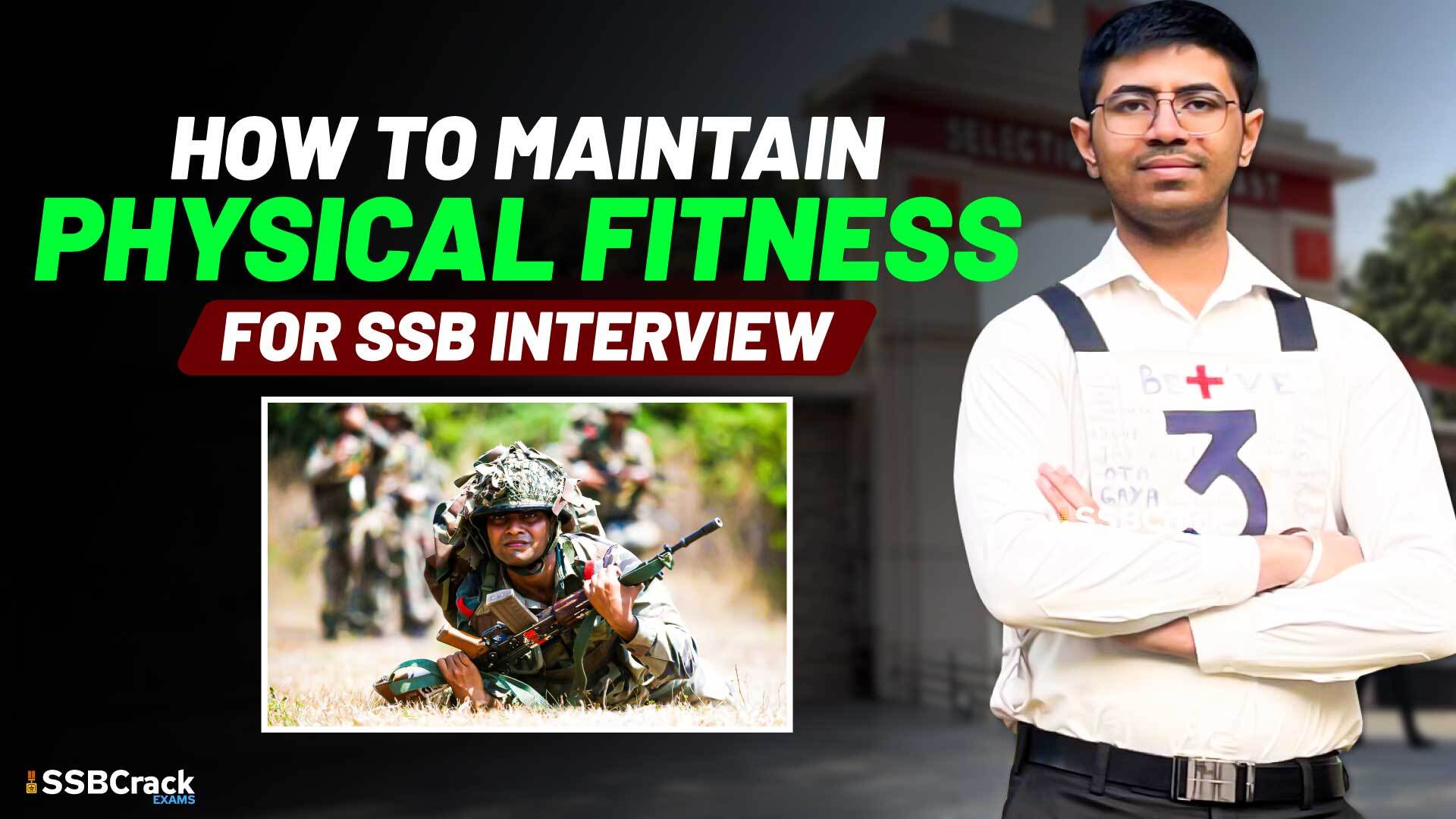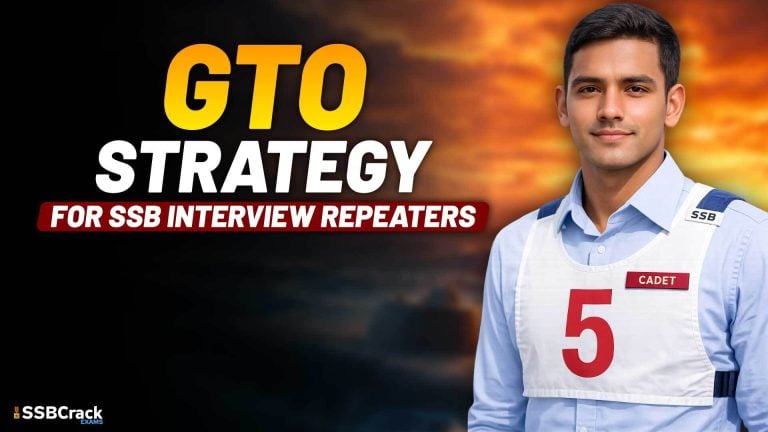Being physically fit for SSB interview is essential for anyone aspiring to join the Armed Forces worldwide. Officers must be in good shape because they engage in activities like long marches, handling weapons, and even hand-to-hand combat. However, some candidates overlook the importance of fitness in the SSB Interview, mistakenly thinking it’s solely a mental selection process. This article aims to shed light on how an individual can maintain physical fitness in the SSB Interview and provide comprehensive guidance on how candidates can maintain their physical fitness to excel in this assessment.
Why is Physical Fitness Essential for the SSB Interview?
The SSB Interview is distinct from a regular interview as it incorporates physical tasks alongside mental assessments. While these tasks may not be as physically demanding as those encountered by soldiers, they still require a certain level of fitness. Activities such as Full Group and Half Group tasks involve carrying weights and performing exercises like planks, demanding physical strength and endurance.
Even during individual obstacle tests, candidates encounter challenges like the Burma Bridge, Tarzan Jump, and Tiger Leap, all of which necessitate stamina, strength, and agility. Meeting these challenges within specific time limits requires candidates to be physically prepared for the SSB Interview.
How To Maintain Physical Fitness For SSB Interview
Physical fitness is a crucial aspect of preparing for the Services Selection Board (SSB) interview, where candidates are evaluated not only for their mental acumen but also for their physical strength. Here are some essential tips to help candidates enhance their physical fitness for a successful SSB interview:
1. Running and Stamina Building
Commence your fitness journey with shorter runs, gradually increasing the distance to boost stamina, an important element for successfully navigating the physical tasks in the SSB.
2. Strength Training with Push-ups and Sit-ups
Regularly include push-ups and sit-ups into your routine is essential for building upper body and core strength, vital for overcoming the challenges posed by SSB obstacle courses.
3. Outdoor Sports Participation
Elevate your fitness levels by engaging in team sports such as football or cricket, fostering coordination, teamwork, and overall physical fitness, all of which are beneficial for the SSB assessment.
4. Swimming for Full-Body Workout
Integrate swimming into your workout regimen for a comprehensive full-body exercise that enhances both muscle strength and cardiovascular fitness, contributing to your overall preparedness for SSB tasks.
5. Obstacle-Specific Training
Enhance your readiness for SSB challenges by simulating obstacle tasks in your workouts, focusing on activities like climbing, balancing, and navigating obstacles.
6. Regular Exercise Routine
Ensure consistency in your exercise routine, covering cardiovascular, strength, and flexibility exercises, to maintain optimal physical conditioning for the demands of the SSB Interview.
7. Healthy Lifestyle Choices
Foster a balanced lifestyle by adopting a nutritious diet, staying adequately hydrated, and ensuring sufficient sleep, all of which contribute to overall physical well-being and readiness for SSB.
8. Flexibility Exercises
Integrate stretching exercises into your fitness routine to improve flexibility, a valuable asset for successfully tackling the varied obstacle courses encountered during the SSB Interview.
9. Endurance Training
Focus on building endurance through activities such as long-distance running, preparing your body for the sustained effort required to excel in the physical aspects of the SSB assessment.
10. Practice
Regularly practice SSB physical tests to assess your current readiness, identify areas for improvement, and plan your training practice accordingly, ensuring optimal performance during the actual assessment.
By following these comprehensive guidelines and maintaining a disciplined approach to physical fitness, candidates can significantly enhance their readiness for the physical challenges presented during the SSB Interview, thereby increasing their chances of success in this crucial selection process. Remember, physical fitness is as vital as mental preparedness for achieving success in the pursuit of a career in the Armed Forces.
FAQs
Q1: Why is physical fitness important for the SSB Interview?
Physical fitness is crucial for the SSB Interview as candidates are required to perform various physical tasks such as obstacle courses, group activities, and endurance tests. Being physically fit enhances candidates’ ability to excel in these tasks, thereby increasing their chances of success in the interview.
Q2: Can I neglect physical fitness and focus solely on mental preparation for the SSB Interview?
Neglecting physical fitness can significantly hamper your performance in the SSB Interview. While mental preparation is essential, physical fitness is equally important as it directly impacts your ability to complete tasks efficiently and showcase your overall suitability for a career in the Armed Forces.
Q3: What types of exercises should I focus on to maintain physical fitness for the SSB Interview?
Candidates should focus on a well-rounded fitness routine that includes cardiovascular exercises like running, strength training exercises such as push-ups and sit-ups, flexibility exercises, and endurance-building activities. Additionally, participating in outdoor sports and obstacle-specific training can further enhance physical fitness for the SSB Interview.
Q4: How often should I exercise to maintain physical fitness for the SSB Interview?
It is recommended to exercise regularly, aiming for at least 4-5 days a week. Consistency is key to maintaining physical fitness, so establishing a regular exercise routine and sticking to it is essential.
Q5: Are there any specific dietary recommendations to support physical fitness for the SSB Interview?
Maintaining a balanced and nutritious diet is important to support physical fitness. Focus on consuming a variety of fruits, vegetables, lean proteins, whole grains, and healthy fats. Stay hydrated by drinking an adequate amount of water and limit the intake of processed foods and sugary beverages.
Q6: How can I assess my current level of physical fitness for the SSB Interview?
Candidates can assess their current level of physical fitness by attempting practice SSB physical tests, such as obstacle courses and endurance challenges. Additionally, tracking progress in running times, strength improvements, and overall stamina can provide insights into fitness levels.
Q7: Is it necessary to consult a fitness trainer or coach to prepare for the SSB Interview?
While it is not mandatory, consulting a fitness trainer or coach can provide personalized guidance and tailored workout plans to effectively prepare for the physical challenges of the SSB Interview. They can also help in addressing specific areas of improvement and optimizing training efforts.
Q8: Can women follow the same fitness routine as men for the SSB Interview?
Yes, women can follow similar fitness routines as men for the SSB Interview. However, it’s important to adapt the routine to individual fitness levels and goals. Women may also focus on exercises that target specific areas of strength and endurance relevant to the physical tasks encountered during the SSB Interview.
Q9: What should I do if I have limited time to prepare for the SSB Interview?
If time is limited, prioritize high-intensity workouts that target multiple muscle groups simultaneously. Focus on exercises that mimic the physical tasks encountered during the SSB Interview and aim for consistency in training efforts to maximize results within the available time frame.
Q10: How can I stay motivated to maintain physical fitness for the SSB Interview?
Set realistic goals, track progress, and celebrate achievements along the way. Find a workout buddy or join a fitness group for support and accountability. Visualize success in the SSB Interview and remind yourself of the importance of physical fitness in achieving your career aspirations in the Armed Forces.







